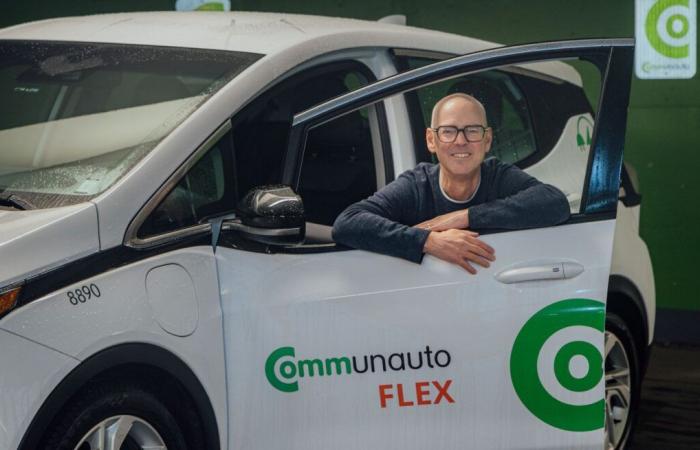
Communauto celebrates its 30th anniversary. The company which started modestly in 1994 in the Saint-Jean-Baptiste district of Quebec, with three cars and a handful of motivated members, now has nearly 300,000 subscribers spread across 18 Canadian cities, as well as an antenna in France. The company holds a predominant place in the world of car sharing in Quebec, but for its founder, Benoît Robert, the main competitor remains the same: individual ownership of a car.
Benoît Robert was 30 years old when he launched Auto-Com, a vehicle sharing cooperative. The model did not exist on this side of the Atlantic, apart from a pilot project in San Francisco in the 1980s. His research ultimately led him to discover projects in Europe, notably in Berlin, which fueled his master’s project at Laval University on the urban environmental benefits of a car-sharing service in a North American context.
“At the beginning, my goal was to convince people to start a car-sharing company here so that I could study it, but since no one was interested, I did it myself,” he says.
Live like a student
Benoît Robert will very early encounter skepticism from the authorities and potential partners. “I was told that North America is not Europe. » But, according to him, the importance for Quebecers of having their own car is an “urban legend”. “Yes, there are people who are emotionally attached to their vehicle, but the majority, it is not an emotional attachment, it is a necessity,” he repeats.
Car sharing is a well-known concept today: it allows you to have a vehicle at your disposal when you need it, without having to worry about its maintenance and tire changes, in particular.
Benoît Robert saw great potential in this formula. “If we are able to offer the advantage of the automobile without the hassle of owning one, it may not meet everyone’s needs, but I told myself that, if that could be useful for 5% or 10% of the population, it was already a huge market,” he explains. “We see it today: in Montreal, 14% of households subscribe to the service and, in certain neighborhoods, it exceeds 30%. »
The beginnings were not easy. While his friends had their first “real job », Benoît Robert still lived like a student. “I was used to living with cardboard boxes as furniture,” he recalls. And the money he had put aside to repay his student loan was instead used to complete the financing of his young cooperative.
It did not take Benoît Robert long to understand that the cooperative formula was not suitable. “I answered the phone myself, sometimes while camping, because I was the one people called to reserve a car, seven days a week,” he emphasizes. He had to call a meeting of members to dissolve the organization and transform it into a non-profit company in 1997. In the meantime, Communauto was founded in Montreal in 1995.
A short-lived competitor
It took time to get help from municipalities. In Quebec, Auto-Com ended up being able to rent parking spaces from the City. In Montreal too, it took several years to benefit from spaces in municipal parking lots. “Quietly, we managed to translate this into real partnerships,” indicates Benoît Robert, citing the agreements concluded with transport companies.
Car sharing has experienced ups and downs, with among others the episode of Car2Go, which appeared suddenly in 2013 in Montreal and disappeared in 2019. But Benoît Robert repeats it: the real “competition” at Communauto is the individual ownership of a car, not other car sharing services.
Time has passed, and Communauto has expanded its territory and gained subscribers. Today, the company is present in 18 Canadian cities, including Toronto, Calgary and Halifax, in addition to having a branch in France. Next year, Communauto should reach the milestone of 5,000 cars in Montreal. “It’s stimulating growth, but it poses lots of challenges from an organizational point of view, because there we’re changing scale,” admits Benoît Robert. “It puts pressure on IT systems and interaction between teams. Before, employees were multitasking. Now we are creating divisions in the work. »
And there was COVID-19. Despite a period of forced slowdown, the company subsequently experienced an acceleration in its growth, maintains Benoît Robert.
However, the purchase of new vehicles has been hampered by supply chain issues, resulting in a lack of availability of cars for subscribers. “From 2023, we have managed to secure our orders. This year, we can say that we have managed to catch up in terms of supply and demand,” says Mr. Robert. “We still have supply problems. We take what the manufacturers are willing to sell us. The models are getting bigger and bigger. This creates pressure on costs and on the fees that we have to charge to customers. »
The spirit of sharing
A subscriber from the start, when the service was still called Auto-Com in Quebec, Anne Dupuis — member number 137 — remembers the beginnings of Communauto. “Many members came from cultural and community backgrounds. I was a student. We thought it was a brilliant idea. »
After a move which led her to end her subscription, she returned to Communauto when she arrived in Montreal in the 2010s. According to her, the initial spirit of the project still exists. “To be a member of Communauto, you must be ready to share a space that is usually very private. We must accept the delays of some and the inconveniences of others. We accept defects because we accept this principle of sharing. »





